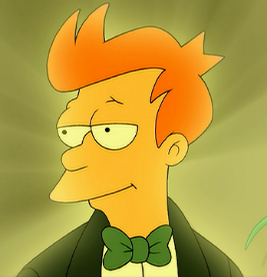As in, doesn’t matter at all to you.
My philosophy is that languages are made up to make communication easier and they change all the time anyway. So as long as you are understood, that’s more important than getting the grammar to be perfect. Getting it like 80% right is plenty and that last 20% consists of a bunch of obscure or ambiguous rules that would take up way too much of my processing power to keep track of while communicating, thus hindering the purpose of using language in the first place. Also, English is a stupid mess of a language. I don’t have enough respect for it to follow all of it’s rules.
That said… what DOES bug me a little is people who make videos who regularly misuse words. Not because I think it’s that big of a deal, but… come on… this is your job and you have complete control over the work at every step of the way and have so many opportunities to correct mistakes. You write the script. You read it. You watch it again while doing editing and could easily re-record bits that are wrong or awkward. Although perhaps this is less about the language specifically and more about leaving mistakes and bloopers in videos in general. That’s what editing is for. We have more advanced editing tools available to the average person than ever before. USE THEM!
Y’all is completely fine to use. It was a mistake for English to lose its distinction between second person singular and plural. Either we accept the word “y’all” or we go back to saying thou and thee, either way we can’t just keep on awkwardly dancing around not having a distinction between second person plural and singular.
I will always use “who” because “whom” gives off too much of a Reddit vibe.
Putting the punctuation outside the quotes (or parentheses) when the quote is only part of a sentence. I.e. He said “I need to go now”.
My pet peeve is people thinking they are being clever by complaining about the supposed incorrect usage of literally as figuratively.
People, including famous authors, have been literally (not hyperbole) using the word as an intensifier, and therefore, figuratively, since 1847, e.g. F Scott Fitzgerald, Charles Dickens, and William Thackeray.
Did we change the definition of ‘literally’? | Merriam-Webster - https://www.merriam-webster.com/grammar/misuse-of-literally
This one is great.
In Dutch you’re supposed to write “Volgens mij” (“in my opinion”), but it’s pronounced more like it’s one word. So I feel “volgensmij” flows better
volgens mei niet!
Anything is acceptable if it’s for comedic effect.
Most of it, as long as it’s understandable I don’t care. Language is about making yourself understood.
All of them, unless there’s need to be accurate.
Edit: I misread the topic, it says “in defence of”, but for some reason I got it backward.
My answer is about the simple grammar I would lile to see more respected.
I leave my original answer for context.- Anyways instead of Anyway
- your instead of you’re
- their instead or they’re and a couple others…
I’m perfectly fine with pretty loosey-goosey interpretations of when to use semi-colons. I realize that there is a specific use-case, but in reality it’s just used for the most part as a sort of elongated comma; where the intention in the writing is to have a longer pause than a normal comma would.
And I’m absolutely fine with that. No one is really clear on the real semi-colon usage anyway. I’m relatively sure that the last sentance in the previous paragraph is the actual correct usage technically, but who knows? And more importantly, who cares?
That’s not how you use a semi-colon; you use it when you want to show a logical connection between what would otherwise be two separate sentences.
Exactly my point. In my brain, that’s exactly how I used it. The two statements were logically related, but were separate statements. The fact that the second statement didn’t have it’s own subject-object-verb is (in my mind) irrelevant.
aluminum
This is a correct spelling. Not the only correct spelling, but one of them
I will also die on the hill that its incorrect
Period AFTER the end of a quote.
My buddy Joe told me “I will live and die on this hill”.
For me in American English it’s also the commas that go inside the closing quotation marks, even when they’re not part the original quote. I die a little every time I see this, so illogical.
If it’s not part of the quote, just leave it outside.
I’m shocked no one else pointed this out. This isn’t a rule of grammar — this is a style rule, which isn’t actually part of the English language. Different style guides recommend different things. This happens to be specifically delineated by American/Canadian style guides vs British/Australian style guides; however anyone could publish a style guide. If USA Today decided to make and publish a style guide that they used in their articles that said there should be periods both within and after a quote, that would be valid by that styleguide.
Absolutely. Anyone who has done any programming should recognize that changing what’s in the quote is corrupting the data.
If I’m quoting a question though, then it makes sense to include the question mark in the quote.
I laughed when Joe asked "That's the hill you chose?".If the murky depths of my memories of school is correct, the location of the period is dictated by whether or not it is part of the quote. So, if the quote should have a period at the end, it goes inside the quotation marks. If the quote does not include the period (e.g. you are quoting part of a sentence), but you are at the end of a sentence in your own prose, you put the period on the outside of the quotation marks.
Ugh, there should be one before AND after!
So is this correct?
My buddy Joe told me. “I will live and die on this hill”.
My buddy Joe told me: “I will live and die on this hill.”.
imo.
You’re saying two separate sentences and they both need punctuation.
The whole thread and post is about not caring about minor errors, sure. And half the time we don’t add periods to the end of our text messages… but, it’s a quoted sentence. If we’re quoting, and you’re not going to use correct punctuation for one of the sentences, at least close the sentence within the quotations. Otherwise, why quote at all.
My buddy Joe told me that he’d live and die on this hill.
vs
My buddy Joe told me, “I will live and die on this hill.”.
It’s just easier not to quote unless is something specific, factual, and evidentiary… in which case you might as well go formal with it.
I hate how much I agree with you in principle and how ugly it looks in practice. With doubled periods, at least - different marks don’t trigger that same reaction. For example, a question mark inside, followed by a period or comma outside feels right.
It’s ok to do a partial quote. Leave out the dot.
So wait, you don’t care, or you think it should be done a certain way? OP asked what doesn’t matter to you at all.
Isn’t that how it’s done in English (Traditional)?
Using commas, wherever you want.
They should be logical thought breaks, not adhere to any rules of grammar.
I have to, take issue with this, one. The rules of commas are, pretty, easy actually: Use a, comma where you’d, pause when speaking. If, you read it out, loud and sound like Captain, Kirk then you put, a comma in the, wrong spot.
Found Christopher Walkin.
This one I’m so guilty of, it just seems fine when used in moderation, even if I know it’s wrong.
I’ve always just used them where natural breaks would be if the sentence was spoken. I know how it’s supposed to be used and I’ll do it correctly when writing papers, but it hurts inside to see it that way. I don’t understand how it improves comprehension.
I can’t read things comfortably with too many commas. My internal monologue stops at each if them.
I mean commas can be used specifically for pauses in speech
Right. Too many commas makes for too many pauses in speech.
There’s places where a comma can cause psychic damage.
“Y’all”
I will die on the hill that it’s more efficient and neutral than the alternatives.
For years I have said that y’all is the best thing to come out of the south.
“Y’all” and the plural “all y’all” are part of my daily vocabulary. And I’m in no way of southern origin.
First we’re all like “Thou is too casual, gotta use the plural second person instead.” Then oh no, turns out number in pronouns is actually useful sometimes, but thou sounds old fashioned now, so we just gotta re-pluralize the second person. And then you get y’all.
I like y’all, but I almost wish we could just bring thou back.
English has to bend over backwards to make up for the fact that it doesn’t have a natural plural 2nd person form.
Ye Y’all Youse (Dublin)
I recently realized that w’all needs to be shakespeared too. Following the pattern of other languages, y’all and w’all are missing in English.
Also, I shakespeared the verb shakespeared, in reference to Shakespeare making up new words by following patterns among other words.
I won’t argue against w’all. I’m fine with it in principle. But it’s not something I think I’ve ever said, or ever heard anyone say.





